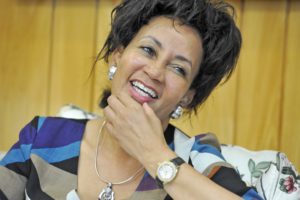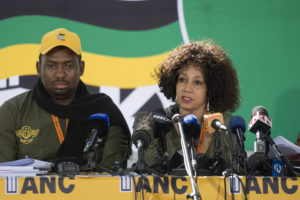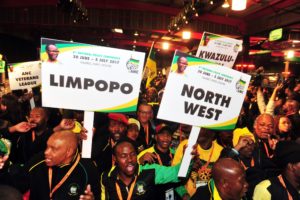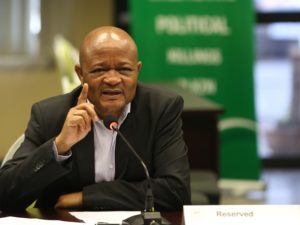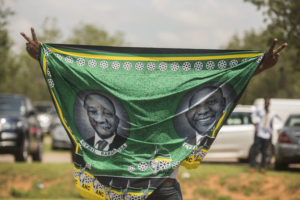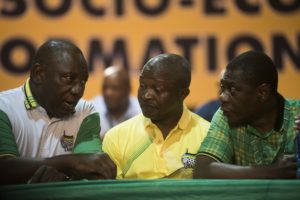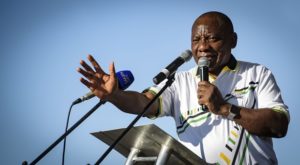The burden of being a Sisulu
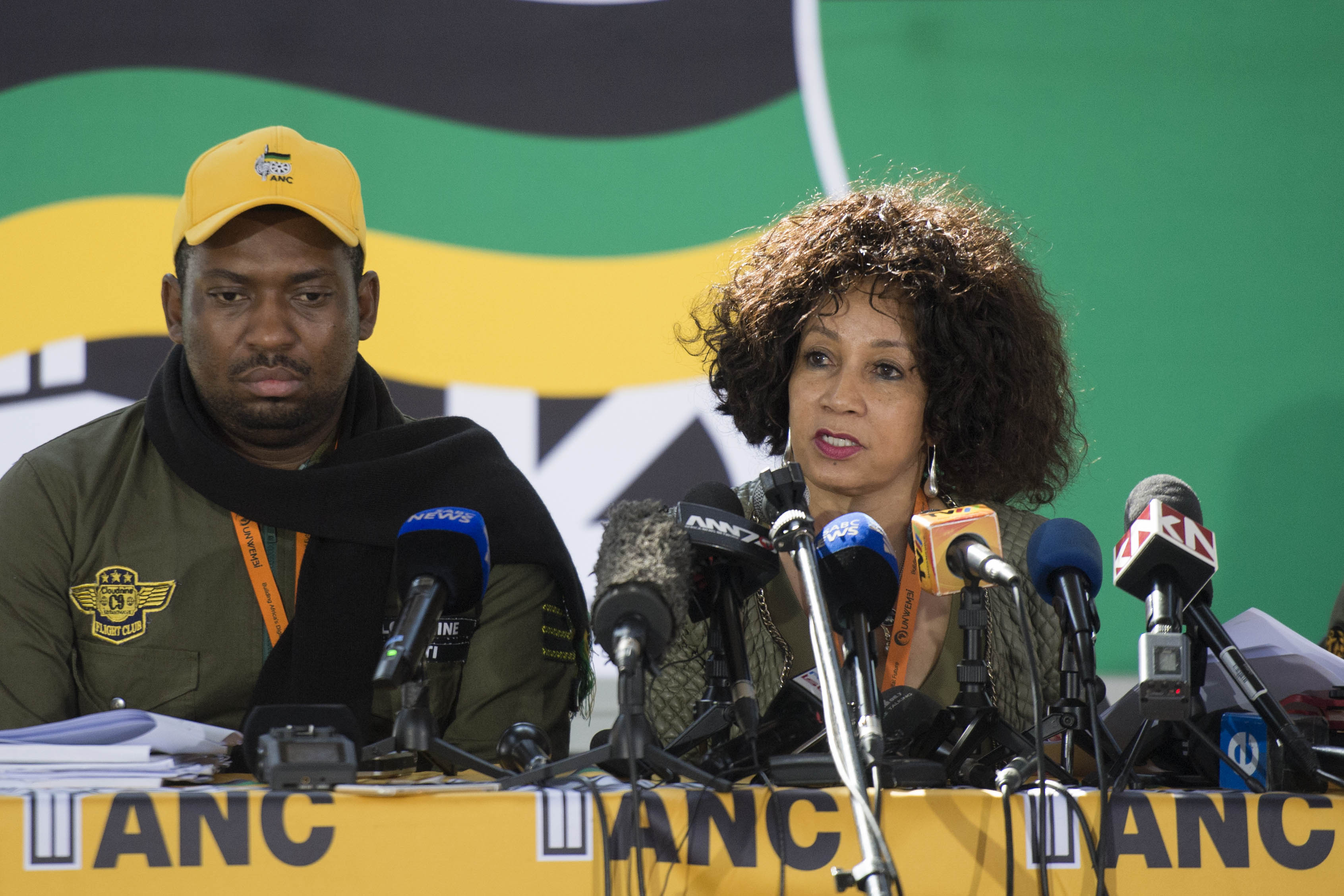
JOHANNESBURG, SOUTH AFRICA – JULY 05: Housing Minister Lindiwe Sisulu addresses the media during the African National Congress (ANC) 5th national policy conference at the Nasrec Expo Centre on July 05, 2017 in Johannesburg, South Africa. 3500 delegates from branches across the country gathered for the conference to discuss the party’s policies going into the elective conference in December, where changes and new policies will be ratified. (Photo by Gallo Images / Beeld / Deaan Vivier)
“The Sisulu name was not a great name when we were growing up. It was a very persecuted name,” Lindiwe Sisulu says.
“When history is rewritten, you will find that the youngest political prisoner came from my family. We were arrested; my brothers and I at the ages of about six, seven with no parents.
“It instilled in us a determination that we are going to fight back. It wasn’t a burden, it was a determination.
“Now, suddenly, this name that brought us so much harm has been twisted to mean something completely different, as though we are finding ourselves with this great name either to live up to it or to seek entitlement,” a combative Sisulu told City Press.
She began her campaign to lead the ANC as a firebrand, taking on President Jacob Zuma, defending the stalwarts and demanding that state intelligence look into the Gupta leaks.
Following several missteps, Sisulu’s campaign has been reduced to a defensive play.
Previously, Sisulu took on national executive committee (NEC) members who attacked party stalwarts for speaking out against Zuma and calling on him to resign.
“Let the person who picks up the stone and throws it be quite certain that they have contributed to this country more than our veterans. None of them would.”
While some NEC members might feel the veterans have ulterior motives in criticising Zuma, she said they should be given the space to speak out.
“We had a discussion with the Boers who killed us. Why would we not give space to our own?”
She’s now having to respond to claims that she is arrogant and entitled.
“I’ve grown up in an era where black people who talk their minds were cheeky k’s, because their space was just to listen.
“Now, if arrogant is the new normal for somebody who is able to think for themselves and is able to do that which they set out to do, then I wouldn’t even bother responding to that.
“I have been in the ANC all my life. I have been in government since 1996. If they are suddenly discovering that I am arrogant, they must have been out of the country in Australia or very far away.
“I actually regard myself as an extremely approachable person. But I don’t take too much wrong,” she says firmly.
“It has allowed me to cope, to manage my inner pain”
The setting is her campaign’s office in Sandton.
The interview was supposed to take place in the garden but with the sprinklers hissing and the insects chirping, her team opts for the boardroom.
I’m told by two excited men that the offices have 17 full-time staff. They handle the call centre, do fundraising and research, campaign on social media and organise events.
“This is not a Mickey Mouse campaign,” one of the gentlemen announces proudly.
They say they are working on a shoestring budget, but the posh office space tells a different story.
Sisulu is different compared with how she was at the start of her campaign – hardened. She speaks faster, appears to anticipate negativity and smiles less.
When asked about her late husband, she lets down her guard.
“I am the kind of person who runs away from pain,” she says slowly, as if counting her words.
“This [the campaign] has taken up a great deal of my time and in a way it has allowed me to cope, to manage my inner pain.
“I could be sitting at home thinking what would my husband be doing now, what would he be saying now?
“I think if there is a life hereafter, he would be pleased I took this step.
“He was a kind of Che Guevara, a continuous revolutionary. We were kindred spirits in that way, just completely married to the revolution. So I think wherever he is, he would be glad I went this way.
“He would be worried that he isn’t here to protect me because this isn’t a pleasant space to be in when you are a woman.
“I am not comparing myself to Nkosazana [Dlamini-Zuma].
“I am saying that I don’t have a natural fallback position, which he would have provided if he was alive.”
Her husband, Kenyan-born academic Professor Rok Ajulu, died in late December last year, after an illness.
Then ANC stalwart Ahmed Kathrada died in March. Sisulu considered him a father figure.
“I came in when the doctors had told us he was dying, I took a flight from Cape Town, I was one of the last people they were waiting for.
“I got there and he was gasping and I thought: What a life! What have we given back to this man? His whole life was a struggle,” she says of her beloved Uncle Kathy.
“My husband was not aware he was going to die so he was not in any pain, emotional pain; but Kathy was and he was angry and it is a sad indictment on us.
“Maybe when I stop running and I start thinking, I might just descend into a great depression, but right now I’m carried by all of these great people who bought us here. It is a great resource for me.”
Fall from grace
In recent weeks, Sisulu has been plagued by a series of blunders, leading to her fall from grace and her exclusion from Cyril Ramaphosa’s slate, where she had been touted for the position of deputy president.
Sisulu received a serious backlash when she appeared to question secretary-general Gwede Mantashe’s struggle credentials.
Days after that, when asked during a radio interview about Zuma’s rape accuser, Fezekile Kuzwayo, she said: “I believe she believes she was raped.”
Shortly after her interview with City Press on Thursday, she issued a tweet stating that she joined the struggle at age six.
Following a twitterstorm, she tweeted that she had made a typo and had in fact been 16.
Ramaphosa publicly announced, in an unprecedented move, his preferred slate this week. He replaced Sisulu with Naledi Pandor.
“I don’t want to speak for Cyril nor do I want to get into that fray. I don’t feel any loss at being left out. When Cyril and I meet and we talk, he talks about my campaign and I talk about his campaign.
“We tease each other. I say: ‘Even without my permission you put me as a deputy. Why didn’t you put yourself as my deputy?’ and he laughs. I say to him: ‘I’m going to sort you out and put you as my deputy.’
“So it is always almost in a jocular way, but they did go ahead and put my name there and they hadn’t done the necessary consultation.
“I feel so sorry for him because I know what it’s like to be in that kind of position and it doesn’t matter what explanation he gives. He is really in a very unfortunate situation.
“I don’t know if poor Naledi was even consulted, so I don’t want to comment on that. All I can say is I feel very sorry for him and I hope it blows over,” she adds with a coy laugh.
Left off the Ramaphosa slate, Sisulu’s chances at emerging victorious are slim.
Her saving grace could be that Ramaphosa’s about-turn came after the ANC branch general meetings, which had followed the directive to nominate Sisulu as his deputy initially.
With that horse having bolted, another opportunity to redeem herself could come at the conference itself, with a nomination from the floor.
Should she emerge as one of the ANC’s senior leaders, Sisulu will have to take a firm stance on Zuma’s future.
She previously indicated that amnesty would be on the cards, should he be willing to disclose all.
“I’m not religious. I am religious in the sense of being thoroughly ANC, but I believe there is a scripture part that goes to how many times you would forgive someone.
“And the answer is for as long as it is possible. He will be forgiven for as long as he indicates to us, tells the truth and is able to commit to working with everybody and committed to ensuring that we can reverse some of the problems that we are experiencing and ensure that those people who are so strongly attached to him are back in the fold,” she said at the time.
This week, she was noncommittal about whether she would advocate him to vacate his position as state president after December.
“The issue of the president for me is not the most important thing.
“I strongly believe that when the time comes, those people who are at the helm of the organisation need to have a discussion with Zuma, which we didn’t do with comrade Thabo [Mbeki].
“Thabo is a rational man. He would have made the right decision, but the environment was very heated then.
“Why should we continuously repeat the same mistake? I don’t know.
“I am certain that if we handle this in such a way that he is part of that decision, he [Zuma] will be bound by that decision.”
* This article first appeared in City Press on 12 November 2017.
(Photo credit: Gallo Images / Beeld / Deaan Vivier)
